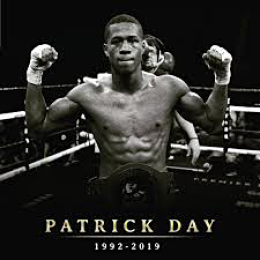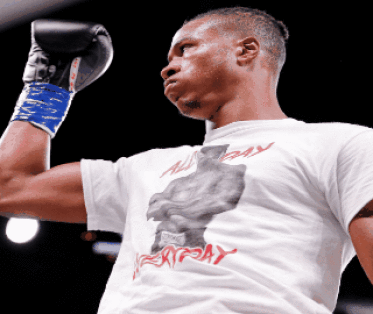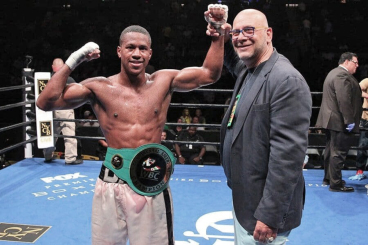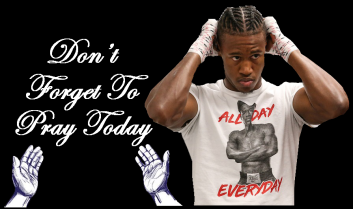
Patrick “All” Day:
A Life Tragically Cut Short In The Ring!
On October 12, 2019, a professional boxing match at Wintrust Arena in Chicago became a turning point in a year marked by devastating losses in the sport. Patrick Day, a light middleweight boxer from Freeport, Long Island, New York, suffered a traumatic brain injury during a knockout loss to Charles Conwell in a USBA super welterweight title bout, and died four days later. He was 27 years old.
Patrick Day
Born: August 9th, 1992
Birth Place: Freeport, New York
Residence: Freeport, New York
Pro-Debut: January 23rd, 2013
Alias: "All Day"
Division: Super Welterweight
Stance: Orthodox
Height: 5′ 9″
Reach: 74″
Career: 2013-2019
Record: 17-4-1, 6Ko’s
Bouts: 22
Rounds: 126
Ko’s: 27.27%
Died: October 16th, 2019
The fighter who entered the ring that Saturday night was more than just an athlete. Patrick was the son of Haitian immigrants and had earned an associate degree in nutrition from Nassau Community College and a bachelor's degree in health and wellness from Kaplan University.
A bright and charismatic young man with a smile that would have made a model jealous. Day started boxing in 2006 under the guidance of U.S. Marine, NYC Firefighter and boxing trainer Joe Higgins, and quickly rose through the amateur ranks. In 2012, he won two nationals titles, the New York Golden Gloves tournament and was an Olympic team alternate. His amateur record was 75–5, and he was recognized as the number-one ranked amateur boxer in the United States in the 152-pound division.
Day turned professional in 2013 and overcame early career struggles to become a world-rated junior middleweight contender. He captured the WBC Continental Americas championship in 2017 and the IBF Intercontinental championship in 2019. In June 2019, he was rated in the top 10 by both the WBC and IBF. By the time he faced Charles Conwell, Day had a professional record of 17-4-1 with six wins by knockout.
Day was knocked down in the fourth and eighth rounds of the bout before several punches to the head from Conwell again sent him to the canvas in the 10th and final round. The final knockdown was particularly brutal—Day's head bounced off the canvas and the ref immediately stopped the fight.
Day was attended to by medical personnel before he was taken from the arena on a stretcher. What began as a devastating loss in the ring became something far more tragic. Day suffered a seizure after the fight and then fell into a coma. He later underwent emergency brain surgery.
Perhaps no one felt the weight of this tragedy more intensely than Joe Higgins, the man who had coached Day from the day the 14-year-old wandered into his garage in 2006. Higgins, a retired firefighter and 9/11 first responder who had lost his brother Timothy in the Twin Towers collapse and worked the recovery site, had found healing in Day's presence and infectious spirit.
Day's trainer, Joe Higgins, a hero of the 9/11 terror attacks who ran into the fire to try to help people and has suffered a lifetime of illness and health issues as a result, was distraught. Day's family lived across the street from Higgins', and Higgins still remembers the day when Day's family brought infant Patrick home from the hospital.
In the hours before Day's death, Higgins sent a text to ESPN that revealed the depths of his anguish: "I'm dying. I feel like I'm responsible, like I let him down. My special kid." The trainer vowed never to participate in boxing again: "I'm never watching another boxing match. I'm never training another kid. I'm never going to put another kid in danger of a punch. Ever." He called boxing "a bloodsucker sport."
In a moment of profound grief, Higgins instructed his assistants to shutter the Freeport PAL gym and change the locks: "In honor of Patrick Day, no one's going to hit the last bag he hit, or spar in the last ring he sparred in. I'm not even donating it. That stuff's going somewhere no one can ever find it again. That's just the way I feel."
Yet amid the darkness, Higgins found clarity about his role in Day's life and legacy. "Pat saved my life," said Higgins. "And now I'm praying God saves his." He would later explain that he did not feel responsible for Patrick's death. Instead, he believed "God knew that" Patrick "said he was gonna change the world," and it was now up to him to complete that mission: "I'm gonna complete his mission. I'm going after it, and if the conditions don't change, then boxing will be abolished!"
Most remarkably, Higgins extended compassion to Charles Conwell. After receiving Conwell's emotional letter expressing remorse, Higgins opened a social media account to reach out: "Hello Charles, I am Patrick Day's trainer Joe Higgins. I just wanted you to know that we do understand what you must be going thru as well. As devastated as we are we realize you are equally devastated. We know if it was the other way around we would be just as distraught. Thank you for your kind words. Patrick was born across the street from me so our relationship is special. He would have wanted you to continue. I'm rooting for you to reach your dream, the same one he had. God Bless your Team and we will keep you in our prayers as well."
Day died Wednesday, four days after sustaining head injuries in the fight. Promoter Lou DiBella said Day died at Northwestern Memorial Hospital. He was surrounded by his family, close friends and members of his boxing team, including his mentor, friend and trainer Joe Higgins.
In the wake of Day's death, his management company issued a statement that transcended the moment of loss to address boxing itself. DiBella Entertainment said that Day's death made it "very difficult to explain away or justify the dangers of boxing at a time like this. While we don't have the answers, we certainly know many of the questions, have the means to answer them, and have the opportunity to respond responsibly and accordingly and make boxing safer for all who participate."
(DiBella Entertainment — October 16, 2019)
Patrick Day passed away today, October 16, 2019, succumbing to the traumatic brain injury he suffered in his fight this past Saturday, October 12, at the Wintrust Arena in Chicago, IL. He was surrounded by his family, close friends and members of his boxing team, including his mentor, friend, and trainer Joe Higgins. On behalf of Patrick’s family, team, and those closest to him, we are grateful for the prayers, expressions of support and outpouring of love for Pat that have been so obvious since his injury.
Before establishing himself as a world-class professional fighter, Pat was a highly decorated amateur. He won two Nationals titles, the New York Golden Gloves tournament, and was an Olympic Team alternate, all in 2012. Day turned pro in 2013 and overcame early career struggles to become a world-rated super welterweight contender. He captured the WBC Continental Americas championship in 2017 and the IBF Intercontinental championship in 2019. In June 2019, he was rated in the top-ten by both the WBC and IBF.
He was also a dedicated college student, having earned an Associate’s degree in Food and Nutrition from Nassau Community College and, subsequently, a Bachelor’s degree in Health and Wellness from Kaplan University. He was a son, brother, and good friend to many. Pat’s kindness, positivity, and generosity of spirit made a lasting impression with everyone he met. During his short life, boxing allowed Patrick to impact many communities, both big and small. In his hometown of Freeport, Long Island, he was a beacon of light and the star pupil at the Freeport PAL, the gym he trained in from the moment he began boxing until the last bout of his career. He was recognized as one of Long Island’s finest professional fighters for years. He was a fixture in the boxing community throughout New York City. Patrick was even known in Japan, where he had traveled to spar with his friend and colleague, world champion Ryota Murata.
Patrick Day didn’t need to box. He came from a good family, he was smart, educated, had good values, and had other avenues available to him to earn a living. He chose to box, knowing the inherent risks that every fighter faces when he or she walks into a boxing ring. Boxing is what Pat loved to do. It’s how he inspired people and it was something that made him feel alive.
It becomes very difficult to explain away or justify the dangers of boxing at a time like this. This is not a time where edicts or pronouncements are appropriate, or the answers are readily available. It is, however, a time for a call to action. While we don’t have the answers, we certainly know many of the questions, have the means to answer them, and have the opportunity to respond responsibly and accordingly and make boxing safer for all who participate.
This is a way we can honor the legacy of Pat Day. Many people live much longer than Patrick’s 27 years, wondering if they made a difference or positively affected their world. This was not the case for Patrick Day when he left us. Rest in peace and power, Pat, with the angels.
Let his bright light live on and shine a spotlight on future safety measures for this dangerous sport.
For Charles Conwell, the outcome of the match created an entirely different kind of trauma. Conwell was a 2016 Olympian who competed in the men's middleweight event at the 2016 Summer Olympics. At just 21 years old, Conwell faced the crushing weight of knowing that his performance in the ring had resulted in another fighter's death.
Conwell posted an open letter stating: "I never meant for this to happen to you. All I wanted to do was win. If I could take it all back, I would. No one deserves for this to happen to them. I replay the fight over and over in my head thinking what if this never happened and why did it happen to you."
Dear Patrick Day,
I never meant for this to happen to you. All I ever wanted to do was win. If I could take it all back I would no one deserves for this to happen to them. I replay the fight over and over in my head thinking what if this never happened and why did it happen to you.
I can't stop thinking about it myself I prayed for you so many times and shedded so many tears because I couldn't even imagine how my family and friends would feel. I see you everywhere I go and all I hear is wonderful things about you.
I thought about quitting boxing but I know that's not what you would want I know that you were a fighter at heart so I decided not to but to fight and win a world title because that's what you wanted and thats what I want so I'll use you as motivation every day and make sure I always leave it all in the ring every time.
With Compassion, Charles Conwell
Those closest to Day understood that his decision to pursue boxing was his own. Day didn't need to box—he came from a good family, was smart, educated, had good values and had other avenues available to him to earn a living. He chose to box, knowing the inherent risks that every fighter faces when he or she walks into a boxing ring.
Boxing was what Pat loved to do. It's how he inspired people and it was something that made him feel alive.
Day's death was not an isolated tragedy. His death was the latest in a string of recent fatalities in the sport. Maxim Dadashev, a 28-year-old Russian, died in July after a fight at MGM National Harbor casino in Oxon Hill, Maryland. And 23-year-old Hugo Santillan reportedly suffered cardiorespiratory failure after fighting to a draw in his native Argentina days after Dadashev's death. A Bulgarian boxer, Boris Stanchov, reportedly died in the ring in September during a fight in Albania.
They added that many people live much longer than Patrick's 27 years, wondering if they made a difference or positively affected their world. This was not the case for Patrick Day when he left us.
A legacy to be remembered, the boxing community responded with an outpouring of emotion. Boxing announcer Michael Buffer described Day as a "wonderful young man" and that "everyone in the boxing community is crushed", while WBC President Mauricio Sulaiman said boxing had lost a "brave, kind and wonderful friend".
Patrick Day is remembered not as a fighter defeated, but as a young man who pursued his passion despite the known risks—a fighter who loved what he did and inspired those around him. His legacy serves as a sobering reminder of both the dreams that drive athletes and the real dangers that exist within the sport they love. Always Missed and Remembered, Rest In Peace Patrick…




